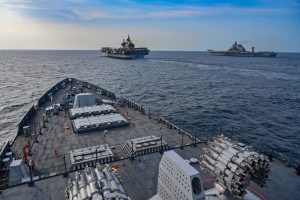Andrew Orchard

In response to threats to maritime shipping in the Indian Ocean Region (IOR) – particularly stepped-up attacks on civilian vessels from the Houthis in Yemen – the Indian Navy (IN) has deployed a force comparable to the U.S.-led Operation Prosperity Guardian.
Operating under national authority, ten or more IN ships with reconnaissance aircraft now patrol the western Indian Ocean, conducting counter-piracy operations. The task force also “maintains a deterrent presence” against threats to shipping. To date, the IN has thwarted multiple pirate attacks and helped seafarers in need.
Retired Vice Admiral Anil Kumar Chawla argued the ongoing operations prove India is a proactive contributor to the international community and a maritime power.
The Houthi attacks and uptick in piracy demonstrate the importance of securing sea lines of communication (SLOC) for India, particularly in the Indian Ocean Region. Retired Admiral Arun Prakash thus sees the current situation as an opportunity to reexamine India’s IOR maritime strategy. Prakash believes a new IOR strategy is required to foster a favorable maritime operating environment given current threats and regional dynamics, including the India-Maldives diplomatic row and the growing presence of the Chinese People’s Liberation Army Navy.
Chinese experts understand the importance of IOR SLOCs to New Delhi. It is essential in protecting critical trade routes for the Indian economy. Between $235-240 billion worth of India’s annual trade passes through the Red Sea.
However, Chinese experts are skeptical of New Delhi’s intentions.
For example, Wang Se, an expert on the Indian military at the China Institutes of Contemporary International Relations, argued in a recent commentary that New Delhi is taking advantage of the crisis to control the IOR as a leader of the “Global South.” Wang views the crisis as enabling the IN to increase its footprint in the northwestern Indian Ocean, complementing other ongoing Indian regional security efforts. Wang also believes India’s naval operations contribute to creating the perception of a responsible stakeholder.
Other Chinese experts argue that the increased IN presence is unhelpful and a “flexing of muscles.” Like Wang, military experts Zhang Junshe told the Global Times that India’s deployment does not address the root causes of the Red Sea situation. Zhang argued that New Delhi should increase its cooperation with the international community, including China, to quell the crisis.
It should be noted that China has taken an unusually passive approach to the current crisis. China has refused to send vessels to the region to help deter attacks, and its government has only made vague offers to “work with all parties cool down the situation” in response.
While Chinese experts believe New Delhi’s means will not achieve its ends, the larger international community welcomes India’s contributions. Increased IN counter-piracy operations could enable Operation Prosperity Guardian participants to focus their forces on the Red Sea situation.
The operations also likely represent the Indian Navy’s growing confidence and capability. Heeding the recommendation of Prakash, New Delhi should look to leverage the IN’s success to develop a new IOR strategy.
No comments:
Post a Comment